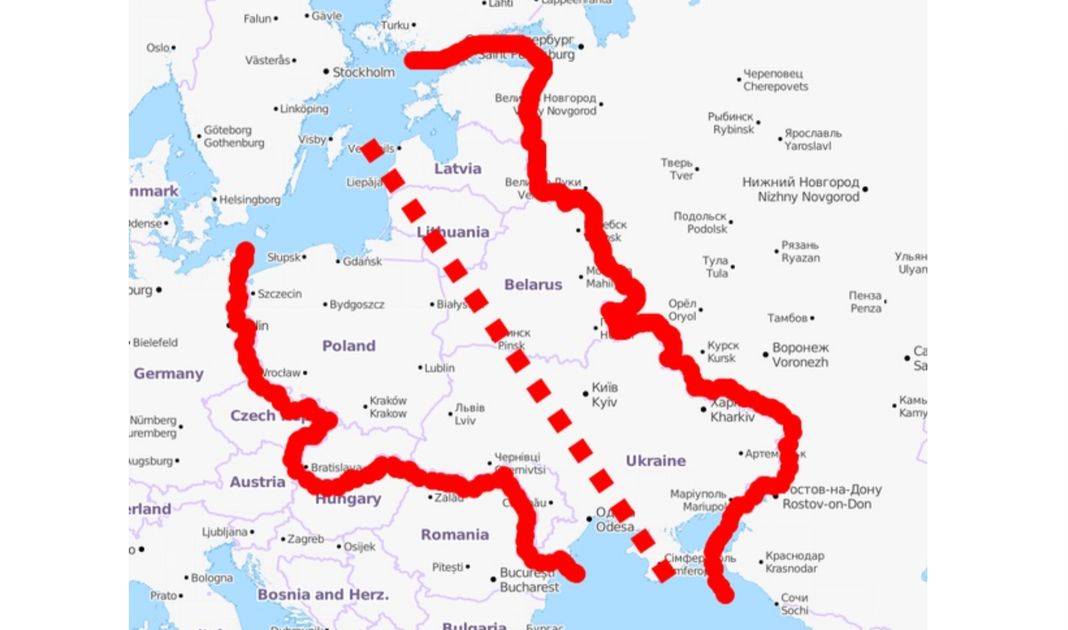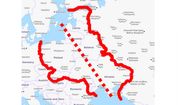Intermarium Weekly 25.03-01.04.2020

(wikimedia.org)
The economic situation is still afloat, but the first signs of instability are already visible – especially the fall of national currencies vis-a-vis the U.S. Dollar. Events are unfolding so fast and unpredictably, that what can be considered a victory or a positive factor one day can easily disappear the next.
Many questions are on the agenda, especially strategic ones:
What future awaits Eastern European commitments regarding 2% to defence budgets if the economic situation begins to threaten social stability in these countries?
What will be with the military readiness of the countries of the NATO Eastern Flank if the Coronavirus affects NATO soldiers directly?
Interesting in this regard are the comments made by former commander of US Army Europe, General Ben Hodges, who recently stressed that “considering the challenges of international border movements in Europe, during the current coronavirus epidemic, we can see that though infrastructure is priority one, just how far we still need to go on fixing diplomatic procedures and Coordination and C2 of cross-border movements.” General Hodges is a famous proponent of the idea of NATO’s mobility in Europe. For him the ability to move forces quickly has political and strategic military advantages, but for this purpose in Europe there has to be a developed and sophisticated system of logistics; railroads and road networks, with an excellent system of communication hubs.
Before the Coronavirus, the “Defender-Europe 20” meant to be the greatest test of the NATO’s unity and assessment of the NATO’s Readiness Initiative. Additionally, it was a message to Russia that the U.S. committed itself to the European continental security and was ready to lift and shift division-size forces within huge European land masses. In general, the Allies had prepared to conduct the comprehensive military exercises, unprecedented for decades, but now things have completely changed, both according to the geography and scale. Now, after a year of preparations everything has turned to a completely different picture and all ambitious aims shrunk to the level of ordinary small level military drills.
However, the nature of the problem is even bigger than simply termination even such great drills as “Defender-Europe 20” because Covid-19 put the greater question about the ability of NATO forces to maintain its readiness. The virus paralyzed already thousands of American soldiers throughout the world. A striking example is an American aircraft carrier in the Pacific. Speaking about a problem in general, we can see that it is not about the Eastern Europe, but only the biological challenge which we face threatens the military, economic and political might of the West, and the termination of the “Defender-Europe 20” is a manifestation of the current crisis.
China in Eastern Europe
Estonia has ordered antiviral protection and medical equipment from a company in China. Tallinn explained that supplies could not be ordered in Europe right now so they considered that it is better to order from China. Moldova will also purchase 100,000 COVID-19 tests in China.
China Merchants Port Holdings announced that the company has completed the initial closing of the proposed acquisition with respect to eight target terminals in CEE worth $814.78m. More rumours appear in the business community that Chinese companies are readying up for a cheap shopping frenzy once the pandemia crisis hits industry and infrastructure assets hard across the Intermarium.
U.S. in Eastern Europe
Ukraine received its first shipment of American oil this year. The tanker Minerva Kythnos arrived in Odessa with 80.5 thousand tons of Bakken oil and was loaded up at Port Neches (USA, Texas) on February 27. The cargo will be processed at a Ukrainian facility, the Kremenchug Refinery, which lies on the Dnieper between Dnipro and Kiev. One additional tanker to Odessa is expected this week, but this time with Azerbaijani oil. The Sea Jaguar vessel (which flies under the flag of the Marshall Islands) was loaded with 83.7 thousand tons of Azeri Light oil last week in the Turkish port of Ceyhan.
Moreover, the Ukrainian company “Naftogaz” settled on an additional agreement to the oil transportation agreement between Ukrtransnafta and BNK Limited (Great Britain), a 100% British subsidiary of the Belarusian Oil Company, worth up to UAH 100 million ($3.5 million). Thus, Belarus is to continue oil purchases through Ukraine in April.
The U.S. will allocate to Belarus $1.3 million in aid to combat the spread of coronavirus infection COVID-19 in the country. Money will be allocated for health care.
The European Union and the “Eastern Partnership”
The EU issued an official press release in which it pledged to support the Eastern Partnership countries and has reallocated €140 million for the most immediate needs in Armenia, Azerbaijan, Belarus, Georgia, the Republic of Moldova, and Ukraine. In addition, the Commission will also redirect the use of existing instruments worth up to €700 million to help mitigate the socio-economic impact of the coronavirus crisis. The Commission has also made available more than €11.3 million in small grants to civil society organizations. In doing all of this the EU appears to be attempting to respond to its critics and trying to play more of a geopolitical role in the East.
Russia’s policy of Fake News to divide European allies
The Russian media have published claims suggesting that Poland did not grant permissions for Russian aircraft carrying coronavirus humanitarian aid to Rome to enter Polish airspace. Reportedly, for those reasons, the Russian planes need to use a longer route of 2,400 kilometers, passing over the Black Sea, Turkey, Greece, and Albania. The Polish MoD issued a brief and clear response to the aforesaid claims: The Russian side has not submitted any requests to enter the Polish airspace.
How deep is the expected recession (or depression)?
Recession seems inevitable. The only issue is about the scale of this recession or in the most dramatic scenario even a global depression. In Poland, the Polish Fund for Development expects a recession of over 10% followed by a long recovery. In the Baltic States the situation is the same. In Latvia, economists are expecting recession of around 6.5% of GDP of the country.
For Estonia, the forecast of economic decline is around 6% of the real GDP. The Lithuanian central bank forecasts that the country’s economy may contract between 3.4 and 20.8 percent this year, depending on how long the nationwide quarantine remains in place. The duration of quarantine is the crucial issue both for social and economic stability of any country now. According to modeling from Polish data science company ExMetrix, Poland will reach a peak of approximately 9,000 COVID-19 infections around 20 April. That figure roughly aligns with the 10,000 cases that Health Minister Łukasz Szumowski had previously forewarned on 10 March. It is possible to forecast that Eastern Europe will have more or less the same ratio and timeline as Poland.
IMF and Eastern Europe
The IMF created on its website an online tracker named “Policy Responses to Covid-19.” In addition to this, the IMF established a “System of Catastrophe Containment and Relief Trust.” The aim of the trust is to provide grants for debt relief for the poorest and most vulnerable countries, hit by catastrophic natural disasters or public health disasters. Ukraine, Georgia, Belarus, Moldova etc., for example, hope to tackle the upcoming economic crisis through IMF mechanisms. On March 26, the IMF put things straightforwardly for Ukraine that the country must adopt two legislations: legislation to improve the bank resolution framework “Anti-Kolomoysky Law” and on Land Reform which would allow, according to the IMF moving forward quickly with finalizing the parameters of the new arrangement.
Ukraine is at war with Russia and Coronavirus
Ukraine is facing huge – even enormous – difficulties in the economic and political spheres because of Russian aggression and social instability, but additionally to these factors, Ukraine faces the factor of global pandemia and global economic slowdown. The situation is approaching unpredictable conditions. Plus, thousands of Ukrainians are coming back home from Russia and the European Union countries. Furthermore, the situation is deteriorating. In the Ukrainian-Russian military front, the factor of Coronavirus continues to play a serious role, but the confrontation is still continuing. A Ukrainian authority has initiated the selective testing of Ukrainian soldiers for coronavirus who are on the frontline and the Government continues to finance the Ukrainian army on a full scale, despite the economic crisis and pandemia.
Ukraine (under the pressure of the IMF) is set to adopt a law which allows foreigners to buy Ukrainian land. This would create a political crisis and divide the country even more than it already is. Ukraine is gradually becoming explosive and as we have known, this country has quite interesting characteristics. Instability in the country creates and triggers global and regional instability. A weak Ukraine would eventually push Russia for reaction.
Belarus in tranquility, Lukashenka – “Belarus is working – without noise and dust”
In Belarus, the political and social life is stable, with no effect of Coronavirus yet. Lukashenka is convinced that the US decision to introduce a state of emergency was short-sighted: “Trump, as a person who was once engaged in business, quickly orientated himself. I liked his last statements very much. He said this: if we do not immediately return to enterprise and start working, then significantly more Americans will die from unemployment than from the coronavirus. Now you understand why I did not close the company? Although there was a sea of advisers: close the borders, close businesses, quarantine everyone.” Lukashenka is even opposing quarantine as a method of fighting against the Coronavirus. Moreover, he has said that Coronavirus will not stop the upcoming elections and the Belarusian opposition is preparing for the elections too, although they have announced “online primaries.”
At the same time, Belarus has asked Russia to fulfill their obligations regarding Belarusians that are citizens of the Union State and receive them from abroad as Russian citizens. Previously, there were incidents when the Russians refused to take Belarusians onboard evacuation airplanes from Thailand. Despite the fact that the Union State exists, the Russian Federation has closed its border with Belarus. Concurrently, Russia asks Belarus to remove roaming between two states as soon as possible.
The President of Armenia Nikol Pashinyan called Lukashenka, and they both complained about the current situation with prices of the oil and gas which they have been importing from Russia. They “stated an overestimated level of prices for natural gas, noting that they obviously do not correspond to the world level and the current situation as a whole. In spite of Belarusian games against Russia he, for example, recently in front of the generals, made a reservation that NATO has “significantly retreated from their original plans.”
Nevertheless, he emphasized that the issue of responding to the exercises “Defender of Europe 2020” is a “question in the face of the day.”
Autor
Ridvan Bari Urcosta
Senior Analyst at Strategy&Future





Trwa ładowanie...